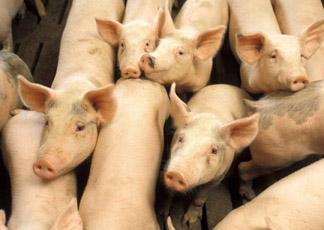Cornell veterinarians confirm first U.S. human case of meningitis from pig strep
By Krishna Ramanujan

Last summer, a previously healthy farmer checked into Bassett Hospital in Cooperstown, N.Y., complaining of sudden fever and confusion. His pulse was racing, and he was breathing rapidly. He had meningitis, an inflammation of the membranes covering the brain and spinal cord.
The hospital's lab revealed the presence of bacteria endemic in pigs called Streptococcus suis that can jump to humans and cause meningitis. The farmer was the first reported case of S. suis meningitis in a human in the United States. He was treated with antibiotics and made a complete recovery.
The case is described in the March 23 issue of the New England Journal of Medicine (NEJM). While physicians from Mary Imogene Bassett Hospital discuss the human health insights in the publication, Ruth Zadoks, research associate and veterinarian at Quality Milk Production Services (QMPS), an arm of the Animal Health Diagnostic Center at Cornell University's College of Veterinary Medicine, provided the veterinary insights and a DNA-level analysis of S. suis strains found in both the farmer and the farm from where the pigs originated.
With the farmer's bacterial cultures and the pig samples, Zadoks confirmed that the patient was indeed infected with S. suis, and she identified three other strains of swine strep among the 13 pig samples. Although none of the strains in the pigs matched the human strain, Zadoks noted that not all the pigs that the farmer came in contact with in June 2005 could be accessed when samples were finally collected in September that year.
"Even though we did not match the human strain with those of the pigs, the strain from the farmer matches superficially a strain found in both pigs and humans in Denmark and the Netherlands," said Zadoks. "Some strains are more likely to cause disease in humans."
While S. suis has occasionally jumped to humans in Europe over the past 20 years, people have regularly contracted the disease in Southeast Asia, especially in China, where a 2005 outbreak of 204 human cases -- mostly farmers and butchers -- resulted in 38 deaths, and some 600 pigs were killed. In 2005 South America also documented its first case in Argentina.
"It could be that the disease is spreading," said Zadoks. "But also we may be just better at recognizing it."
Just as with the avian flu, all human cases of S. suis have originated with an animal infecting a human. Unlike the bird flu, however, public health officials have no expectations or fears that the pig bacteria will spread from one human to another.
Still, the infection is "certainly an occupational hazard for those in the pork industry," said Frank Welcome, a senior extension associate and veterinarian at QMPS who was first contacted by Bassett Hospital regarding the human S. suis case.
"This case should heighten awareness of the possibility of illness caused by Strep. suis in people with occupational exposure to swine," said Kara Willenburg, M.D., of Bassett Healthcare and the lead author of the letter published in NEJM. "It should not impact the general public."
Farmers can contract the disease from handling swine and pig feces. Butchers are also at risk. Washing hands and cooking pork thoroughly can minimize risk.
Deborah Sentochnik, M.D., an infectious disease specialist at Bassett Healthcare who received her A.B. from Cornell, was also a co-author of the NEJM letter.
Media Contact
Sabina Lee
Get Cornell news delivered right to your inbox.
Subscribe